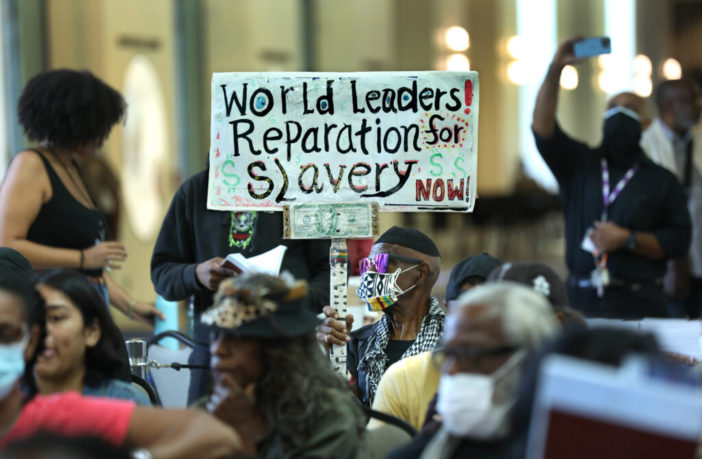Reparations may be on the table for California residents.
A task force, the first of its kind in the nation, committed to exploring the potential for reparations in the sunshine state, says it won’t take a stance on how much Black residents should receive, though an economist estimate puts the number around $800 billion.
The sum totals more than 2.5 times California’s $300 billion annual budget and does not include a recommended $1 million per older Black resident for health disparities that have shortened their average life span, according to the Associated Press. The total also does not account for the amount of property unjustly taken by the government, nor the devaluing of Black businesses, two other harms the task force says the state caused Black residents over decades.
“All forms of discrimination should be considered in reparations,” Thomas Craemer, a public policy professor at the University of Connecticut, told the panel earlier this week. “The task force should feel free to go beyond our loss estimates, and determine what the right amount would be.” Though considerations are being made, Black residents may very well never receive cash payouts, as the decision lies in the hands of the state legislature and Gov. Gavin Newsom. The task force has until July 1 to recommend the forms of compensation to be awarded and who should receive them, along with other remedies to repair past harms and their present ramifications.
The panel’s chair, Kamilah Moore, said that it’s up to the state’s legislature to agree on a restitution amount based on findings by economists, and which the task force approved on Wednesday. “The task force is pretty much done regarding the compensation component. Our task was to create a methodology for calculation for various forms of compensation that correspond with our findings,” she said in an e-mail.
Reparations has long been a topic of conversation for Black Americans, who have endured over a century of unthinkable cruelty at the hands of a country we birthed through our blood. The case for reparations stretches far beyond slavery to include the violence and destruction of the Jim Crow era as well as systemic racism that still affects our community today. Vice President Harris said, from Ghana, earlier this week, that she and President Joe Biden support a reparations study, but the president has so far ignored calls from advocates to create a federal commission. Financial compensation is only one part of the proposed way to make amends. Other potential repayments include compensating incarcerated inmates market value for their labor, establishing free wellness centers and planting more trees in Black communities, banning cash bail, and adopting a K-12 Black studies curriculum.
Whatever the final decision, Black people’s plight in this country deserves to be acknowledged, apologized for, and generously made right in a way that reflects the fact that America would not exist if it were not for the labor, creativity, and souls of our people.



